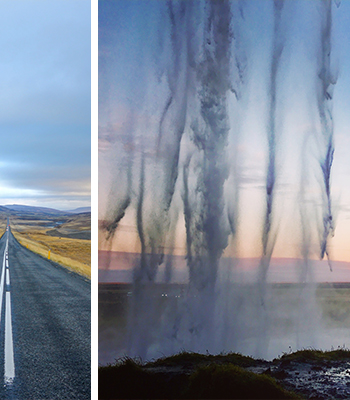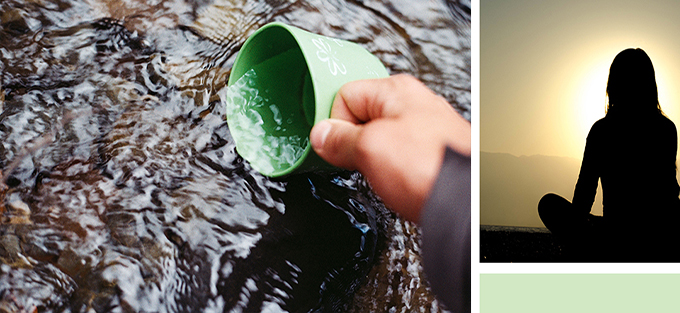by Karen Craigo
The experts say that if you’re feeling thirsty, you’re already dehydrated. Drink plenty of water before you exercise or spend time in the sun, they say, because well before you feel the tug of thirst, your body is already depleted and dehydrated.

I wonder if it works this way with the spirit, too. I know that I frequently go through life on automatic – getting the kids to and from school, doing my work, doing my housework, going to church. And even though I try to make time to worship, to pray, and to contemplate, I know I’m not always fully hydrated in the spiritual sense.
I confess: There are times when I’ve tried to settle into prayer and meditation but random thoughts keep popping up – what will I make for dinner, when is my son’s science project due, and did I remember to pay the cable bill? Unless we are quite disciplined – more disciplined than I am, for sure — the monkey mind always starts chattering away, and it’s hard to drink deeply of God’s presence and love.
Of course I forgive myself, as I fully expect that our loving God forgives and understands. As busy as I am, isn’t God busier? If we believe God’s eye truly is on the sparrow, God is clearly the ultimate multi-tasker. The whole omniscience thing means that the God-mind has no monkeys — but God knows me and knows my intentions.
Lent, the liturgical season devoted to reflection on what our baptism means–our commitment to our faith and to the example of Jesus’ love and sacrifice–asks us to drink deeply from the cup that Jesus himself asked to be taken from him in Luke 22:42: “Father, if you are willing, remove this cup from me; yet, not my will but yours be done.”
We go through these forty days and we’re compelled to look at that chalice, and while we’re not expected to drink it down, we’re asked to take a sip — to taste the suffering of Jesus on the cross.
Prayers for the drive
 Once when I was a much younger, everything just got to me. I’d had a dramatic and haunting breakup. I wasn’t sure about my future. I felt that I had nowhere to go and no one to lean on. So I went for a drive.
Once when I was a much younger, everything just got to me. I’d had a dramatic and haunting breakup. I wasn’t sure about my future. I felt that I had nowhere to go and no one to lean on. So I went for a drive.
I’ve been on a few drives like this in my life, actually — the kind where you head in any direction, no destination in mind but away. You hardly see the scenery, even if, like me, you’re in eastern Kentucky and beauty stretches out in every direction.
And sometimes you take a random left or right, and another, and you spiral yourself into the land, winding yourself up like a clock, all the while believing you were unwinding. Everything comes to a head on a drive like this, when your sole purpose is to lose yourself in the landscape, to disappear into the world. If you come back at all, and you’re not sure you will, you intend to come back changed.
That particular drive took me through the Appalachians, the most beautiful landscape I’ve ever ignored. I tunnel-visioned down roads where trees canopied overhead; I gave the cold shoulder to those places where the dense woods opened up into lush green vistas. I slighted thoroughbreds. I tuned out cows.
It was my habit, and still is, to pray on drives like this. But these prayers aren’t “Our Fathers,” and they’re not formal, and they’re not made of words. Sometimes they’re made of howls. Sometimes they’re angry and there’s no love in them — certainly not what I would call worship. But they’re honest, and they’re an attempt to connect, an attempt to get through.
I was in a low spot, literally and spiritually, when I spotted a waterfall off to the side of the road. It was no Niagara — more like a very strong showerhead — but the sight of it made me pull over. I opened my window, and I was so far back in the woods that I could hear the water smacking against shale.
I turned off my car and crossed the road toward the sound. I scaled the guardrail and slid down a rocky shoulder, then climbed up to that wet shelf. I was fully clothed — T-shirt, sweatpants, sneakers, the accepted uniform of the sad — but I stepped under the waterfall anyway.
I was spiritually thirsty. I was profoundly dehydrated.
I wish I could convey the shock — and I mean that word, shock; it was electric — of stepping under that small, strong flow of spring runoff; of how it felt, to be smacked squarely on the head with that frigid water. I was standing in water that felt impossibly cold, and I was suddenly crying hot, cleansing tears. I was wet, through and through. Deep in God’s creation, just me and the Lord and the living water, I was renewed.
Don’t most of us live dry lives? We go through our days on automatic, forgetting to drink deeply of the cup that is always there for us, the cup that runs over (Psalm 23:5). We don’t realize how brittle we’re becoming. If we’re not mindful — if we forget to take a drink — one hard blow could reduce us to dust.
Lent is the season when Christians recommit. We follow the Savior on his path, even though we know where it leads. It’s painful to go there — to see him stick to his path, and even when people are waving palm fronds in the path of our beloved, we know where he’s going, and we ache for what we know he must endure.
But we also know the end of the story — not death on a hillside, but what comes after. The stone will be rolled away. Love will leave its tomb and will walk across the countryside, his hands not clenched, despite all odds, and you’re invited to touch the hole in their centers.
This Lenten season, I’m going to do my best to drink from that cup — to stay hydrated in all the pain and glory and love that our Savior knew. Maybe it takes Lent to remind me how dry I am.
Discussion questions:
1. When was the last time you felt spiritually dehydrated?
2. What can you do to drink before you feel thirsty?
3. The Bible uses the symbol of the cup in a couple of ways — it runs over in the Psalms, a symbol of blessing and abundance, but Jesus asks God to take it from him in the Gospels, because it feels like more than he can take. What is in your cup?
Closing prayer:
Loving God, thank you for your waters, which heal and lubricate, so that I can begin again to do the work you ask of the faithful: to love one another. In the name of your Son and your sacrifice. Amen.
Karen Craigo teaches writing in Springfield, Missouri. Her spiritual home is Peace in Bowling Green, Ohio, and she currently attends Unity of Springfield.


Loved the post–really hit home for me. There is an awful lot in my cup these days. I alternately want to gulp or smash it to bits. Such is life. But we are not alone in the drive to nowhere in particular–as you know our destination is intended to be the shocking waterfall. Walk wet this Lent and thank you!
Karen, your post is my food for today. Bless you and I thank God for his voice in your words. I will read and reread! God is with you!
This article is so thought provoking and helpful. Thank you.
I am active in WELCA 7B. Is there a way to obtain a copy to share with women in our units? It is something that our grand moms and moms can share with their daughters. thanks again for sharing spiritual renewal.